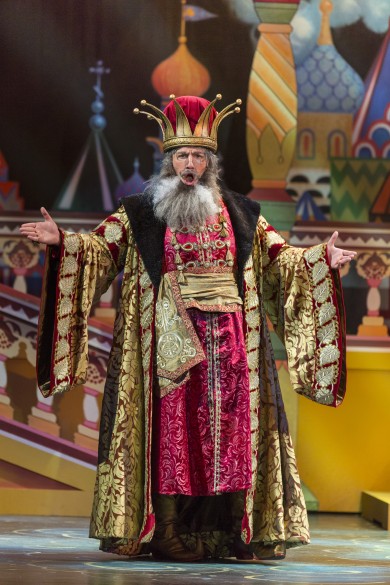Rimsky’s “Golden Cockerel” gets a colorful revival at Sarasota Opera

Grigory Soloviov in Rimsky-Korsakov’s “The Golden Cockerel” at Sarasota Opera. Photo by Rod Millington
In addition to its complete Verdi cycle, Sarasota Opera has also selectively plumbed the fringes of the repertory, presenting works that one is unlikely to hear anywhere else.
This season the adventurous Gulf Coast company has unearthed a real curio, the final work of Rimsky-Korsakov, the opera, Le Coq d’Or (“The Golden Cockerel”), heard Saturday afternoon.
The Russian composer never saw his swan song performed and it’s not very hard to understand why. The libretto by Vladimir Belsky, taken from a Pushkin story–that amazingly originated with Washington Irving’s Tales of the Alhambra–is an acerbic, manifestly anti-Tsarist broadside, clothed as a fantastical fairy tale.
The scenario tells of King Dodon, who avoids his responsibilities to protect his state. A mysterious astrologer brings the king a golden cockerel who will wake him with warnings whenever there is danger. Yet the admonitory avian seems more of an enabler to the lazy king, advising him to “Rule while in bed.” The king loses a war and his two sons kill each other. Ultimately, the king is ensnared in the alluring wiles of the Queen of Shamakha who manipulates him to get control of his kingdom.
The metaphorical opera is a biting satire, and there’s no sympathetic figure in the entire work with most characters archetypes or buffoons. Rimsky’s music is the real attraction here, imbued with the rich languor and Orientalist flavor and melodic contour of his Scheherazade. The most striking vocal element are the showy pyrotechnics for the Queen including the opera’s famous set piece, her “Hymn to the Sun.”
Le Coq d’Or was premiered at the Metropolitan Opera in 1919, as an opera-ballet in French, often paired, bizarrely, with Cavalleria Rusticana. As a fully staged opera, it enjoyed some popularity in the mid-20th century, with Ezio Pinza and Lily Pons racking up 68 performances through 1945. Apart from a revival at New York City Opera with Beverly Sills in 1967, that’s pretty much been it for The Golden Cockerel in the U.S. since.
Sarasota Opera provided a worthy staging though the comedy was on the overbroad and unfunny side under the sit-com stage direction of Tom Diamond. The company offers a colorful if somewhat chintzy-looking production from Sarasota stalwarts Howard Tsvi Kaplan and David P. Gordon with storyboard-like sets that evoke the fairy tale element of the sardonic storyline.
As the obtuse, semi-narcoleptic king, Grigory Soloviov was solid and, of course, idiomatic with the Russian text, though the role really calls for a more sonorous voice than Soloviov’s middleweight bass. One wished he had greater range as an actor with a rather narrow approach to the comedy.
Alexandra Batsios has the vocal chops and flexible top range for the Queen of Shemakha, who bewitches the gullible, lovelorn king. The young soprano handled the dancing and high tessitura of her enticing songs with aplomb and assurance.
The clear standout in the cast was Timur Bekbosunov as the Astrologer. As well as convincingly portraying the king’s doddering advisor, the Kazakhstani tenor showed an astounding voice, tackling the role’s stratospheric high notes with daunting power and easy agility.
As the title avian, Riley Svatos brought birdlike rustling and a clear youthful soprano to the Cockerel’s cries. William Roberts was worthy as the king’s dubious commander, General Polkan. Daryl Freedman provided humorous moments as the meddling housekeeper, Amelfa. Jon Jurgens and Kenneth Stavert were serviceable as the princes, the king’s even less-bright sons.
Conductor Ekhart Wycik drew alert playing from the orchestra, though the performance would have likely made a stronger impact with richer, more luxuriant textures to bring out this kaleidoscopic score. The chorus supplied ample power and refinement under Roger L. Bingaman.
There is one more performance of The Golden Cockerel 7:30 p.m. March 19. Sarasotaopera.org